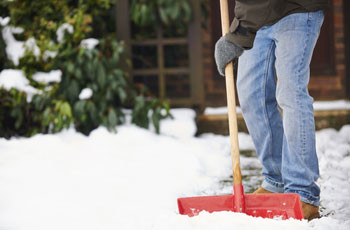
Accumulating snow may be ideal for snowboarders and skiers, but when it comes to keeping driveways clear of the heavy white stuff, certain people should take heart. Shoveling snow can be hazardous to your heart health.
The American Heart Association says most individuals who head out to shovel snow will be fine, but for others, the combination of colder temperatures and physical exertion can place an increased workload on the heart, boosting the risk of having a heart attack.
Why the added risk? One reason is that in cold weather, blood vessels become tighter, making it harder for blood to pass through them. When you combine this fact with the stress of physical activity, it can spell trouble for some shovelers (especially older adults, or those with or who are at higher risk of heart disease):
To help ensure safer snow removal this season, here are six tips:
- Give it a rest. When shoveling, be sure to take rest breaks, so you don't overtax your heart. If you already know you have heart disease, accept that a little snow in the driveway might not be so bad. If possible, ask for somebody else to do the shoveling or plowing, particularly if the snow is heavy and wet.
- Think smaller shovel. Lifting heavy snow raises blood pressure during the lift. That's why it’s safer to lift smaller amounts of snow more times versus lugging a few huge shovelfuls of snow. Trying pushing the snow, or consider using a snow thrower (if one is accessible).
- Watch what you eat. Don't eat a heavy meal before or soon after shoveling, as this can put an extra load on your heart.
- Don't drink alcoholic beverages before or immediately after shoveling. Alcohol can actually increase your sensation of warmth, causing you to underestimate the additional strain your body is under out in the cold.
- Know the heart attack warning signs and listen to your body. Warning signs include chest discomfort; pain or discomfort in one or both arms, the back, neck, jaw or stomach; shortness of breath; and breaking out in a cold sweat, nausea or light-headedness. Even if you're not sure it's a heart attack, have it checked out by a health care provider. Don't wait more than five minutes to call 911, because minutes save lives!
- Be hypersensitive about hypothermia. Heart failure causes most deaths in hypothermia (having an abnormally low body temperature). To prevent hypothermia, dress in layers of warm clothing and wear a hat, because much of the body's heat is lost through the head.
Enjoy the snow and outdoor activities safely.